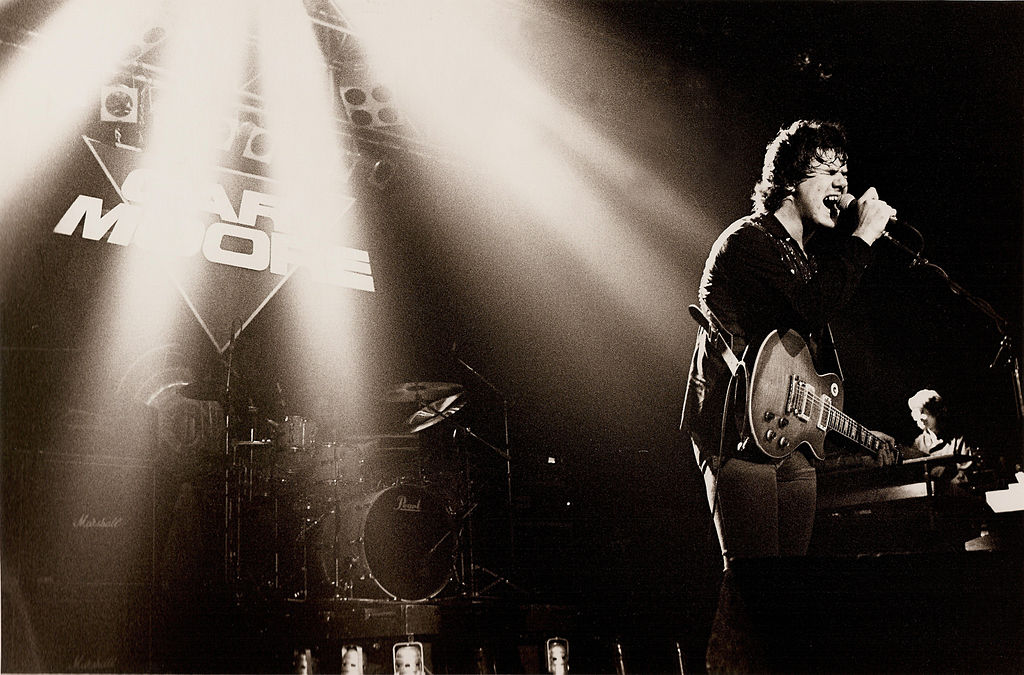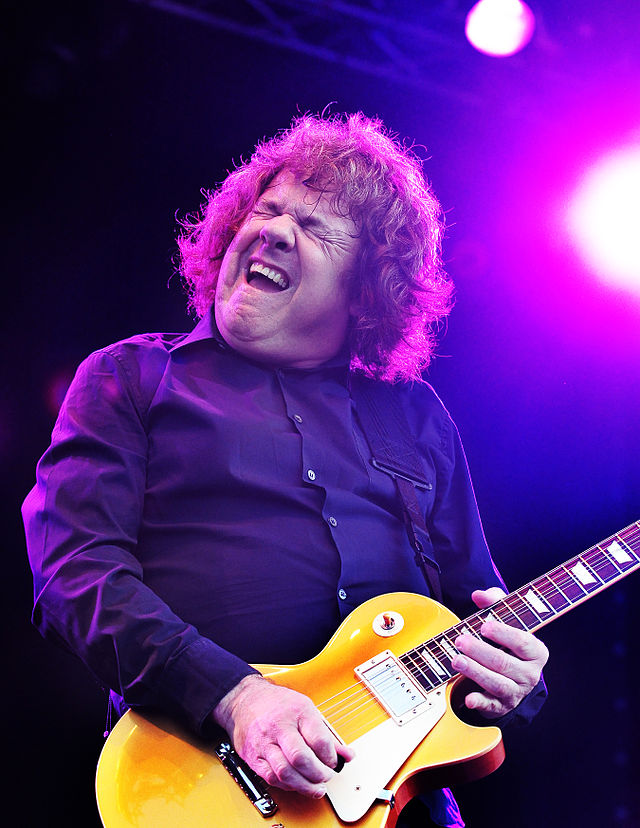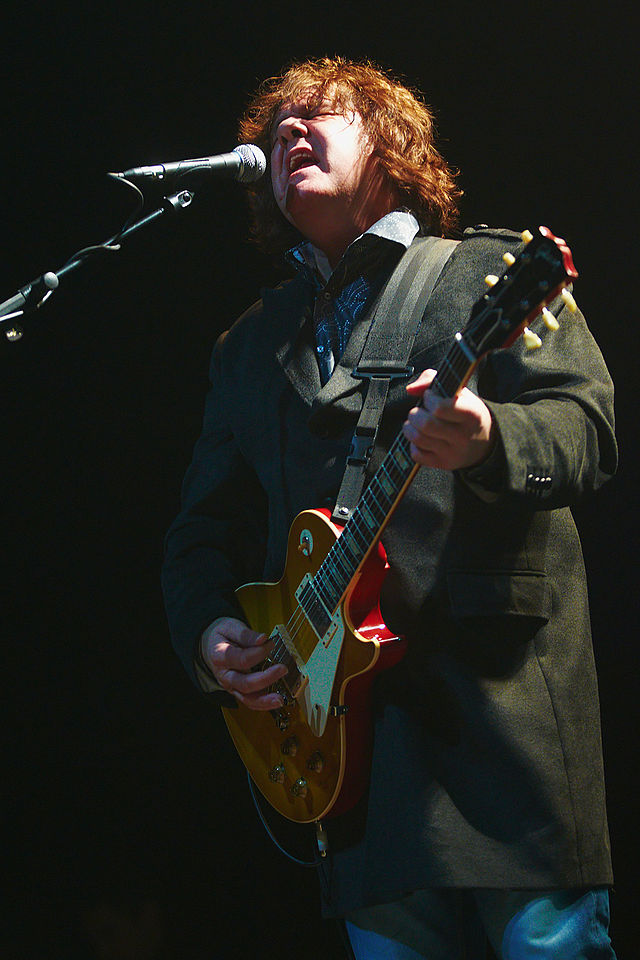BIOGRAPHICAL DETAILS
Full Name: Robert William Gary Moore
Description: Guitarist, Ireland
Known For: In 1973 he released his first solo album, Grinding Stone
Instruments: Guitar
Music Styles: Hard Rock
Location: Ireland
Date Born: 4th April 1952
Location Born: Belfast, Ireland
Date Died: 6th February 2011
Location Died: Estepona
Cause Of Death: Heart failure
Photo Comments: The image above is intended for those who wish to reuse material (text and/or graphics) from the Wikimedia projects — on their own website, in print, or otherwise. It focuses on Commons as this is explicitly a collection of reusable media.
CONTACT DETAILS
Web Site: Official website
Other Links: For other links about this entertainer click on the Links button above
YOUTUBE VIDEO
BIOGRAPHICAL PROFILE
Garry Moore
Robert William Gary Moore (4 April 1952 – 6 February 2011), was a Northern Irish musician, most widely recognised as a singer and virtuoso guitarist.
In a career dating back to the 1960s, Moore played with musicians including Phil Lynott and Brian Downey during his teens, leading him to memberships with the Irish bands Skid Row and Thin Lizzy, and British Band Colosseum II. Moore shared the stage with such blues and rock musicians as B.B. King, Albert King, Albert Collins, George Harrison, and Greg Lake, as well as having a successful solo career. He guested on a number of albums recorded by high-profile musicians.
Moore grew up on Castleview Road opposite Stormont Parliament Buildings, off the Upper Newtownards Road in east Belfast, as one of five children of a promoter named Bobby and housewife, Winnie. He left the city as a teenager, because of troubles in his family – his parents parted a year later – just as The Troubles were starting in Northern Ireland.
Moore started performing at a young age, having picked up a battered acoustic guitar at the age of eight. He got his first quality guitar at the age of 14, learning to play the right-handed instrument in the standard way despite being left-handed.
Aiming to become a musician, he moved to Dublin at the age of 16. Moore’s greatest influence in the early days was guitarist Peter Green of Fleetwood Mac who was a mentor to Moore when performing in Dublin. Green’s continued influence on Moore was later repaid as a tribute to Green on his 1995 album Blues for Greeny, an album consisting entirely of Green compositions. On this tribute album, Moore played Green’s 1959 Les Paul Standard guitar which Green had lent to Moore after leaving Fleetwood Mac. Moore ultimately purchased the guitar, at Green’s request, so that “it would have a good home”. Other early musical influences were artists such as Albert King, Elvis Presley, The Shadows and The Beatles. Later, having seen Jimi Hendrix and John Mayall’s Bluesbreakers in his home town of Belfast, his own style was developing into a blues-rock sound that would be the dominant form of his career in music.
Changing bands
In Dublin, Moore joined the group Skid Row with Noel Bridgeman and Brendan “Brush” Shiels. It was with this group that he earned a reputation in the music industry, and his association with Phil Lynott began.
In 1970, Moore moved to England and remained there, apart from two short periods in the United States. In 1973, under the moniker “The Gary Moore Band” he released his first solo album in 1973, Grinding Stone . “Grinding Stone” was issued in North America on Neil Kempfer-Stocker’s fledgling record label imprint Cosmos and received “Album of the Year” accolades on KTAC-FM/Seattle-Tacoma, Washington in 1974.
In 1974 he re-joined Lynott, when he first joined Thin Lizzy after the departure of founding member Eric Bell.
From 1975 to August 1978, he was a member of Colosseum II. With the band he also collaborated with Andrew Lloyd Webber on the composer’s Variations album in 1978.
In 1977, Moore re-joined Thin Lizzy, first as a temporary replacement for Brian Robertson, and on a permanent basis a year later.
Solo career
In July 1979, he left the band permanently to focus on his solo career, again with help from Phil Lynott. The combination of Moore’s blues-based guitar and Lynott’s voice produced “Parisienne Walkways”, which reached the Top Ten in the UK Singles Chart in April 1979 and the Thin Lizzy album Black Rose: A Rock Legend which reached number two in the UK album chart. Moore appears in the videos for “Waiting for an Alibi” and “Do Anything You Want To”.
He experimented with many musical genres, including rock, jazz, blues, country, electric blues, hard rock and heavy metal.
In 1987, he performed a guitar solo for a cover of the Beatles’ “Let It Be”. which was released under the group-name of Ferry Aid. The record raised substantial funds for the survivors of the MS Herald of Free Enterprise disaster. In 1990, he played the lead guitar solo on “She’s My Baby” from Traveling Wilburys Vol. 3.
After a series of rock records, Moore returned to blues music with Still Got the Blues (1990), with contributions from Albert King, Albert Collins and George Harrison. The album was well received by fans. He stayed with the blues format until 1997 when he returned to the harder rock, but with a softer, more pop and ballad-oriented sound on Dark Days in Paradise followed with another change of direction in 1999, when he decided to experiment with modern dance beats on A Different Beat; this left many fans, as well as the music press, confused. He also contributed guitar sections to Richard Blackwood’s 2000 album, You’ll Love to Hate This.
With Back to the Blues, Moore returned to his tried and tested blues format in 2001: he continued with this style on Power of the Blues (2004), Old New Ballads Blues (2006), Close As You Get (2007) and Bad For You Baby (2008).
In January 2005, Moore joined the One World Project, which recorded a song for the 2004 Asian Tsunami relief effort. The group featured Russell Watson, Boy George, Steve Winwood, Barry Gibb, Brian Wilson, Cliff Richard, Dewey Bunnell, Gerry Beckley and Robin Gibb on vocals (in their order of appearance), and featured a guitar solo by Moore. The song, entitled “Grief Never Grows Old”, was released in February 2005, reaching No. 4 on the UK Singles Chart.
He also took part in a comedy skit entitled “The Easy Guitar Book Sketch” with comedian Rowland Rivron and fellow musicians Mark Knopfler, Lemmy from Motörhead, Mark King from Level 42, and David Gilmour.
Other collaborations included a broad range of artists including Trilok Gurtu, Dr. Strangely Strange, Jimmy Nail, Mo Foster, Ginger Baker, Jack Bruce, Jim Capaldi, B.B. King, Vicki Brown, Cozy Powell, Rod Argent, the Beach Boys, Paul Rodgers, Keith Emerson, Roger Daltrey, and Otis Taylor (musician).
Personal life
In 2002, he bought a five-bedroom detached Edwardian house in Hove, just west of Brighton, Sussex, to be near his sons, Jack and Gus, from his former marriage, which had lasted from 1985 to 1993. Since 1997, he was living with his partner, an artist named Jo, and their daughter Lily (b. 1999). His daughter Saoirse, was born from an earlier relationship while he was with Skid Row. His residence was reported to be on Vallance Gardens in Hove, East Sussex.
Death
Gary Moore died of a heart attack in his sleep at the age of 58 during the early hours of 6 February 2011. At the time, he was on holiday with a girlfriend at the Kempinski Hotel in Estepona, Spain. After a quiet dinner, they went for a walk on the beach before going up to their room. His girlfriend raised the alarm at 4:00 am, and tried to give him a heart massage. His death was confirmed by Thin Lizzy’s manager Adam Parsons.
Moore was laid to rest in St Margaret’s Churchyard, Rottingdean, East Sussex, England, in a private ceremony, with only the family and close friends in attendance.
Discography
Main article: Gary Moore discography
Grinding Stone (1973)
Back on the Streets (1978)
G-Force (1980)
Corridors of Power (1982)
Dirty Fingers (1983)
Victims of the Future (1983)
Run for Cover (1985)
Wild Frontier (1987)
After the War (1989)
Still Got the Blues (1990)
After Hours (1992)
Blues for Greeny (1995)
Dark Days in Paradise (1997)
A Different Beat (1999)
Back to the Blues (2001)
Scars (2002)
Power of the Blues (2004)
Old New Ballads Blues (2006)
Close as You Get (2007)
Bad for You Baby (2008)
External links:
Like so many others, Moore’s early influences were artists such as Elvis Presley and The Beatles.
Gary Moore has remained relatively unknown in the US, although his work has “brought substantial acclaim and commercial success in most other parts of the world – especially in Europe”.
In 1969 he joined the group Skid Row with Noel Bridgeman and Brendan “Brush” Shiels.
After a series of rock records, Moore returned to blues music with Still Got the Blues, with contributions from Albert King, Albert Collins and George Harrison.
Member and lead guitarist for ’THIN LIZZY’. Moore replaced Eric Bell in 1974.Moore left in 1979.Also Skid Row, Philip Lynott, Colosseum II.
Noted for their song ’The Boys Are Back in Town’.
Moore died of a suspected heart attack in his hotel room while on holiday in Estepona, Spain, in February 2011.
Albums include.
Grinding Stone (1973)
Back on the Streets (1979)
G-Force (1980)
Live at the Marquee (1981)
Gary Moore (1982)
Corridors of Power (1982)
Victims of the Future (1983)
Dirty Fingers (1984)
We Want Moore! (1984)
Run for Cover (1985)
Rockin’ Every Night – Live in Japan (1986)
Wild Frontier (1987)
After the War (1989)
Still Got the Blues (1990)
After Hours (1992)
Blues Alive (1993)
Around the Next Dream [‘BBM’ Group: Jack Bruce, Ginger Baker & Gary Moore] (1994)
Ballads & Blues 1982-1994 (1994)
Blues for Greeny (1995)
Dark Days in Paradise (1997)
Out in the Fields: the Very Best Of (1998)
Blood of Emeralds: the Very Best Of (1999)
A Different Beat (1999)
Back to the Blues (2001)
The Best of the Blues (2002)
Scars [‘SCARS’ Group: Gary Moore, Cass Lewis & Darrin Mooney] (2002)
Have Some Moore – The Best Of (2002)
Live At Monsters Of Rock (2003)
Parisienne Walkways: The Blues Collection (2003)
Power of the Blues (2004)
Old New Ballads Blues (2006)
The Platinum Collection (2006)
Live At Montreux DVD [The Definitive Montreux Collection] (2007)
Close As You Get (2007)
Bad For You Baby (2008)
External links:
From Wikipedia, the free encyclopedia



